Deep-C ROV Competitions
 A focus on developing Science, Technology, Engineering and Math (STEM) skills has gained nationwide attention in K-12 education. Its purpose is to excite and prepare students for majors and careers as scientists, technologists, engineers and mathematicians in order to meet the growing workforce demands of the 21st century. Remotely Operated Vehicle (ROV) competitions are a way to engage and challenge students in these fields. Worldwide, these competitions provide a forum for exploring physical science concepts, basic engineering principles, basic circuitry, oceanography and deep sea biology, as well as showcasing student ingenuity.
A focus on developing Science, Technology, Engineering and Math (STEM) skills has gained nationwide attention in K-12 education. Its purpose is to excite and prepare students for majors and careers as scientists, technologists, engineers and mathematicians in order to meet the growing workforce demands of the 21st century. Remotely Operated Vehicle (ROV) competitions are a way to engage and challenge students in these fields. Worldwide, these competitions provide a forum for exploring physical science concepts, basic engineering principles, basic circuitry, oceanography and deep sea biology, as well as showcasing student ingenuity.
|
|
WHAT IS THE DEEP-C ROV COMPETITION?
This competition is part of the Dauphin Island Sea Lab’s hands-on education program, Discovery Hall Programs (DHP). With Deep-C support, DHP hosts an annual teacher workshop in which teachers learn about the importance of ROVs during the Deepwater Horizon oil spill response; how they are used in marine industry and exploration; how to build, wire and operate ROVs; and how to integrate what they’ve learned into their STEM education efforts. Teachers take this information and new skills back to their classrooms or student clubs, and work with students studying the connection between the deep sea and the coast, as well as how scientists use ROVs to conduct research, thereby integrating STEM activities and skills into their curricula.
THE 2015 EVENT
Students from middle and high schools in Alabama, Mississippi, Louisiana and northern Florida will be vying for ROV domination during April 17-19, 2015. This event, sponsored by the Deep-C Consortium, also serves as the Northern Gulf Coast regional competition for the MATE program for Scout, Navigator and Ranger ROV classes. Student teams will have designed and built a unique ROV that they will use to compete in a series of missions based on Deep-C research as well as the MATE theme for the year - ROVs in Extreme Environments. Student teams will also give a presentation, judged by local engineers and scientists, on the design of their ROV. Thanks to Deep-C, the weekend will also be a learning experience above and beyond the competition as students will take a boat trip to the Gulf of Mexico, hear from scientists who use ROVs in their research and enjoy meeting students from other teams. The winner of the competition is eligible to compete in the International MATE competition to be held June 25-27, 2015 in St. John’s, Canada.
FOR MORE INFORMATION
- See highlights from the Second Annual (2014) ROV Competition
- See highlights from the Summer 2013 teacher workshop
- See highlights from the First Annual (2013) ROV Competition
- See highlights from the Summer 2012 teacher workshop
- Apply to participate in the next ROV teacher workshop
- ROV Competition Fact Sheet (PDF)
Or you can visit the MATE regional competition website, email: This email address is being protected from spambots. You need JavaScript enabled to view it. or contact Tina Miller-Way, Chair of DISL’s Discovery Hall Programs for Education & Outreach at 251-861-2141, x2257 or Tracy Ippolito, Deep-C Program Manager at 850-443-9086.
ABOUT DEEP-C
The Deep-C Consortium is investigating the environmental consequences of petroleum hydrocarbon (oil) on living marine resources and ecosystem health in the northeastern Gulf of Mexico. Consortium members seek to increase understanding of the fundamental physical, chemical, and biological connections between the deep sea, continental slope, and coastal waters and their linkages to critical habitats and ecological functions. More than 100 scientists and students at 10 academic and research institutions in the United States and Norway are participating in Deep-C.
ABOUT DISL
The DISL’s mission encompasses marine science education, marine science research, coastal zone management policy and educating the general public. Located on a barrier island and surrounded by Mobile Bay, Mississippi Sound and the Gulf of Mexico, DISL is perfectly situated for marine science activities.
The Deep-C (Deep Sea to Coast Connectivity in the Eastern Gulf of Mexico) Consortium is a long-term, interdisciplinary study of deep sea to coast connectivity in the northeastern Gulf of Mexico. The study is investigating the environmental consequences of petroleum hydrocarbon release in the deep Gulf on living marine resources and ecosystem health. Deep-C research is made possible by a grant from BP/The Gulf of Mexico Research Initiative.
Deep-C was a four-year, interdisciplinary study of deep sea to coast connectivity in the northeastern Gulf of Mexico.Deep-C is no longer an active research project. The information on this website is for historical reference purposes only.
Home | About Us | Research Areas | Data Center | News & Multimedia | Education & Outreach
© Deep-C Consortium. All Rights Reserved.
This research was made possible by a grant fromThe Gulf of Mexico Research Initiative (GoMRI).
Copyright | Disclaimer | Privacy Policy




